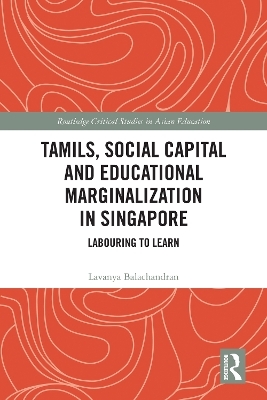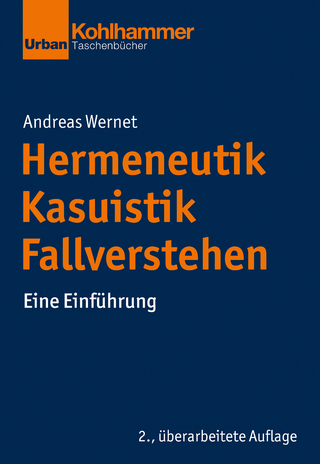
Tamils, Social Capital and Educational Marginalization in Singapore
Labouring to Learn
Seiten
2021
Routledge (Verlag)
978-0-367-14128-8 (ISBN)
Routledge (Verlag)
978-0-367-14128-8 (ISBN)
This volume examines how social capital mediates the interactive effects of race and class on educational underperformance among Singaporean Tamil secondary school students. It aims to address social inequality in non-liberal multicultural contexts.
Labouring to Learn examines academic mobility pathways among ethnic minority Tamil youths in public secondary schools and vocational institutions in Singapore. This book qualitatively examines the interactive effects of race and class on the educational performance of these youths through the lens of social capital. Despite their numerical majoritarian position within the Indian population in Singapore, the foreclosed access for Tamils to diverse class networks within the ethnic community as well as limited inter-ethnic interactions has historically truncated the means to resources and opportunities for social mobility. In schools, the narratives shared by Tamil boys and girls from the lower academic streams and economically disadvantaged backgrounds reveal that they typically experience exclusion on account of racial, economic and academic marginalisation in their everyday lives. Turning to bonding ties among peers and family members provides social support resources that offer some respite from marginalisation. On the flipside, articulations of resistance ensue among Tamil youths that tangibly take time away from learning, and run the danger of strengthening the cultural deficit rhetoric for mainstream society to explain the poor academic performance among ethnic minorities. This account of educational marginalisation amongst Singaporean Tamil youths contributes towards understanding social inequality in a non-liberal multicultural context where marginalisation is differentially experienced across ethnic minority groups and traced to broader socio-historical contexts of migration, assimilation and minority–majority relations. Furthermore, it also articulates the utility of a social capital framework in historically revealing how educational inequality emerged and continues to be sustained in a postcolonial context.
Labouring to Learn examines academic mobility pathways among ethnic minority Tamil youths in public secondary schools and vocational institutions in Singapore. This book qualitatively examines the interactive effects of race and class on the educational performance of these youths through the lens of social capital. Despite their numerical majoritarian position within the Indian population in Singapore, the foreclosed access for Tamils to diverse class networks within the ethnic community as well as limited inter-ethnic interactions has historically truncated the means to resources and opportunities for social mobility. In schools, the narratives shared by Tamil boys and girls from the lower academic streams and economically disadvantaged backgrounds reveal that they typically experience exclusion on account of racial, economic and academic marginalisation in their everyday lives. Turning to bonding ties among peers and family members provides social support resources that offer some respite from marginalisation. On the flipside, articulations of resistance ensue among Tamil youths that tangibly take time away from learning, and run the danger of strengthening the cultural deficit rhetoric for mainstream society to explain the poor academic performance among ethnic minorities. This account of educational marginalisation amongst Singaporean Tamil youths contributes towards understanding social inequality in a non-liberal multicultural context where marginalisation is differentially experienced across ethnic minority groups and traced to broader socio-historical contexts of migration, assimilation and minority–majority relations. Furthermore, it also articulates the utility of a social capital framework in historically revealing how educational inequality emerged and continues to be sustained in a postcolonial context.
Lavanya BALACHANDRAN is a Lecturer at the College of Alice & Peter Tan, National University of Singapore (NUS). Her research interests include inequality and stratification in Singapore with a specific focus on family, education, race and ethnicity and social networks.
Introduction: The Mobility Question in Modern Singapore, 1. Youth and Educational Marginality in Multicultural Contexts, 2. Educational Mobility in a Multiracial City-State — A Social Capital Story, 3. The Politics of Racialization and Social Mobility amongst Ethnic Tamils in Singapore, 4. You are Normal: Contextualizing Schooling Experiences amongst Tamil Youths, 5. Being Tamil in Singapore Conclusion: Labouring to Learn
| Erscheinungsdatum | 17.08.2020 |
|---|---|
| Reihe/Serie | Routledge Critical Studies in Asian Education |
| Zusatzinfo | 2 Tables, black and white; 6 Line drawings, black and white; 6 Illustrations, black and white |
| Verlagsort | London |
| Sprache | englisch |
| Maße | 156 x 234 mm |
| Gewicht | 362 g |
| Themenwelt | Sozialwissenschaften ► Ethnologie |
| Sozialwissenschaften ► Pädagogik ► Allgemeines / Lexika | |
| Sozialwissenschaften ► Pädagogik ► Bildungstheorie | |
| Sozialwissenschaften ► Soziologie | |
| ISBN-10 | 0-367-14128-0 / 0367141280 |
| ISBN-13 | 978-0-367-14128-8 / 9780367141288 |
| Zustand | Neuware |
| Informationen gemäß Produktsicherheitsverordnung (GPSR) | |
| Haben Sie eine Frage zum Produkt? |
Mehr entdecken
aus dem Bereich
aus dem Bereich
Einführung in die Theorie transformatorischer Bildungsprozesse
Buch | Softcover (2023)
Kohlhammer (Verlag)
34,00 €
Eine Einführung
Buch | Softcover (2023)
Kohlhammer (Verlag)
36,00 €


